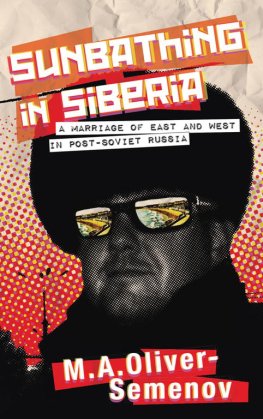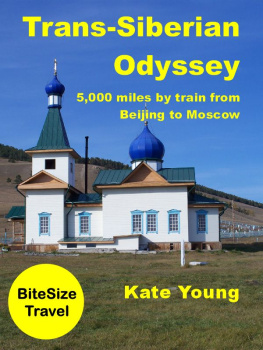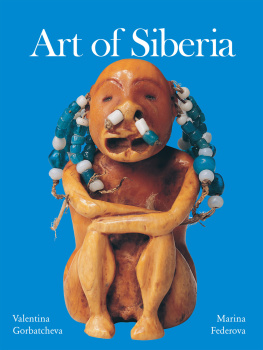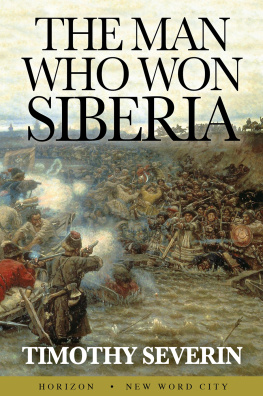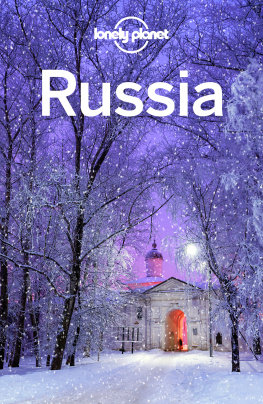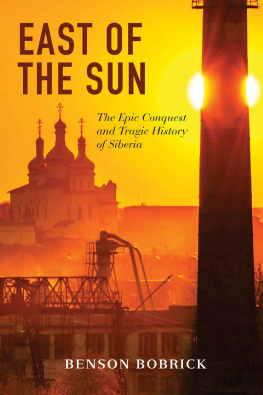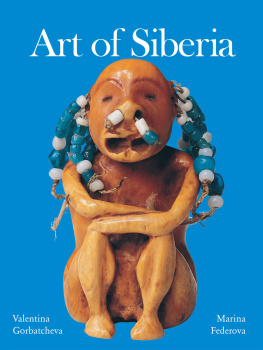Michael Oliver-Semenov was born in Ely, Cardiff, but now resides in central Siberia. Since ditching his career as a banking clerk in 1997 he has published words and poetry in a plethora of magazines, anthologies and journals worldwide, including Blown , The Morning Star , Orbis , Ten of the Best , Wales Arts Review , Mandala Review and Ink Sweat and Tears . He divides his time between growing vegetables at his family dacha, teaching English and writing for The Siberian Times . http://thepoetmao.webs.com
SUNBATHING IN SIBERIA:
A Marriage of East and West in Post-Soviet Russia
M.A. Oliver-Semenov

Aeroflot Flight SU778. August 17 th 2011. Krasnoyarsk Moscow
Arriving back in Krasnoyarsk had felt different from the first time, in that it felt like I was returning home. Although the three months I had spent in the UK were busy, I had felt very claustrophobic, which I think had more to do with staying with my parents than anything else. Its not that I felt I had become Siberian or that my life in the UK was awful, but home was wherever my wife was.
Another reason it felt different is because it was summer, and it was this summer that I learned about the Siberia I had never known or heard of back in the UK. In summer most of southern Siberia is exceptionally hot, and the temperature in places can reach the high thirties. Those first few days in the apartment I had to learn how to cope with extreme heat. In place of the shirt, jumper, trousers and thick socks I had worn in the early spring, I now had to wear shorts, t-shirts and flip-flops. I hadnt worn shorts since the 1990s, so we had to go to the centre to get me some from one of the Chinese markets. Once I had my shorts and flip-flops I was able to enjoy myself, although I was self-conscious with my skin so pale that I reflected as much sunlight as the moon.
Whereas Krasnoyarsk used to be known as a strategic military city, which was closed to Westerners, it is now known as the Russian City of Fountains. This is due to the work of the previous mayor Pyotr Pimashkov, who restored all of the Soviet fountains after they fell into disrepair and threw in some new ones for good measure. Its impossible to walk or take a bus ride without passing at least one. Although people are not technically allowed to splash around in them, everyone seemed to be at it, so we did it too. It was so hot we spent whole days in the city centre walking from fountain to fountain, getting soaked to the skin and eating ice creams. When militia passed in their cars, Nastya cautioned me to stop jumping so hard in the fountains as they might pull over and have a word with me, but they never did. As long as you dont make a public nuisance of yourself, they leave you alone. My whole first week back in Krasnoyarsk was spent this way. It was bliss. I would even dare to call it paradise if it wasnt for the mosquitoes. Unfortunately, these little blood thirsty bastards stage an annual invasion of Russia every June and bugger off again in October. Night-time was the worst. It was so hot that we couldnt leave the window closed, but when it was open, hundreds of mozzies would stream in. We compromised by leaving the window open just a fraction and invested a hundred roubles in one of those plugin anti-mosquito devices that fills the air with scenty stuff and makes mosquitoes breakdance. However, the sound of mosquitoes buzzing away as the madness took them was just as annoying, and when I woke in the morning I had to shake their little corpses off the bed cover and out of my hair.
Ira
Nataliya Petrovnas mother was back from the hospital and living in the small back room next to Nastyas. Because of the language barrier, I never engaged in conversation with her, and neither did Nastya. Opportunities didnt present themselves as she spent most days in her room listening to the radio. Nastyas parents had gone to live at the dacha, though one of them would come back every day to give Ira her pills. Ira had a dodgy heart and needed looking after, having aged rapidly since a bad fall ten years earlier. Before this she had apparently been quite spritely. Nastya told me that after Iras accident all those years ago, anyone who would lend a hand had to spend many hours a day coaxing Ira back onto her feet. She hadnt quite given up the will to live but had given up the will to walk. Thankfully everyones efforts were successful.
In the middle of the afternoon Ira would make her daily trip to the balcony, to sit and watch the world go by. To get there, to get anywhere, Ira, hunched and frail, would lean on a small wooden stool and inch it forward. Every journey she made was equivalent to a long mountain trek for someone in the prime of their life. The sound of that stool scraping across the floor haunted me, especially at night. Ira silent and solitary was a kind of ghost. She existed and yet she wasnt present in our lives. When she was younger, she had been a highly celebrated Soviet scientist and engineer. Having studied at the Yekaterinburg polytechnic at PhD level, she went on to become a leading specialist in platinum and other rich metals. However, she never managed to finish her PhD as her tutor passed away, and there was nobody to replace him at the time. Ira went on to marry Pyotr Karbovski, and had three children, two of whom are now dead. When her husband passed away, it was felt that the best place for her was with her one surviving daughter.
Regardless of Iras failing health, she still managed to maintain a normal dignified appearance. Before I woke in the morning, she would already be dressed in a long flowing gown and wore a red beret to mask her thinning hair. She made regular trips to the bathroom, sat on her stool and washed as best she could. She even cooked all her own meals and did the washing up if we left any dirty dishes by the sink. I was impressed by her stamina and will to continue living as normal a life as possible but sad that she spent so much time alone. To remedy the loneliness of senior citizens, Russian social services provide retired soviet comrades with state of the art mobile phones. Ira had one; I heard her talking on it quite often, though I dont think she knew what any of the other applications were for.
With my brother-in-law Dima and his wife, Marina, working every day, their son Semka would normally spend his weekday evenings with his grandparents. Although they were hardly at the apartment in summer, when they were, Semka would pretend to be afraid of Ira, and nicknamed her Baba Yaga. In Russia Baba Yaga is a fairy-tale witch that chases people around in her dacha, which has a pair of legs of its own. Ira, who we would normally refer to as Baba Ira, as Baba is short for grandmother in Russian, was called Baba Yaga so many times by Semka that I made the mistake of referring to her by that name also. Thankfully Nastya always managed to put her hand over my mouth at the right moment when her mother was around, as she would have been upset by it.
Superstitions
Some people believe in the strangest things. My mother believes her grandmother, my great Nana-Collie was a witch who could make people fall in love with others, or make people ill, by planting certain roots in the back garden with a bit of that persons hair. My mother still practises some of this stuff and reads tarot cards for my sisters and me once a year. Though I dont quite share my mothers views, I can forgive her mystic beliefs as they are, for the most part, quite unobtrusive. The same cant be said for Russian superstitions. For although they are charming in their own way, I have occasionally been really annoyed by either being told not to walk around something, or to say hello a hundred times in the street. It isnt simply a case of not walking under ladders or stepping on the cracks. Russian superstitions are extremely common and practised by almost every Siberian I know; if they are not carefully observed at all times its possible to cause a great deal of offence. During my earlier visit I had witnessed occasional references to certain mystical beliefs, but it wasnt until summer that I fully understood the extent of them.
Next page

